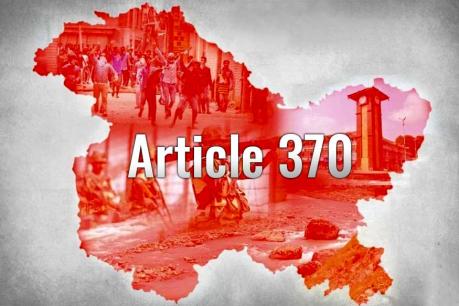In a historic move, Article 370 and 35A have been revoked by the Presidential decree, as announced by Home Minister Amit Shah at 11 am today. These articles were incorporated to confer a special status for the state of J&K, which had resulted in discrimination against individuals in the state who did not have a J&K citizenship even after residing in the state since the past 60 years. However, the hour of equality is here and the citizens have nothing to fear anymore.
Background
From the beginning itself, article 370 was intended to be a temporary provision, for a smooth application of the Constitutional articles to the state. The article provided that only those laws made by the parliament will be applicable to the state which relate to matters specified in the instrument of accession. Moreover, any laws enacted by the parliament will only be applicable to the state once the same have been ratified by the president and the state government.
Article 370 in itself may not seem to be quite as aversive to the unity of the country, but, the laws which it gave rise to are the ones which have led to this division. Using article 370, article 35A was incorporated in the constitution in the year 1954, which specified that any law enacted by the state, which specifies a class of people as the state’s citizens or confer upon those citizens any special privileges as far as employment under the state government, acquisition of immovable property, settlement or aids by the state government; shall not be invalid.
Thus, while article 370 paved way for the incorporation and legal admissibility of the Constitution of Jammu and Kashmir; article 35A ensured special privileges to certain citizens specified in the constitution.
Present ordinance
Through the president’s ordinance, article 35A has been successfully removed and paved way for the removal of article 370. This essentially means that the citizens of J&K now will no longer hold dual citizenship and will be referred to as citizens of India, as is the case with all states. Now that the citizenship clause is done away with, it effectively removes all the added privileges and causes for discrimination that was associated with the title.
Changes
The constitution of J&K defined a permanent resident in the state and only made provisions with respect to people who were living there till 1954. Thereafter, the state legislature had the power to declare any individual as a citizen of Jammu & Kashmir, which was often exercised arbitrarily. This had given rise to unholy activities, the case of the Valmiki community is known to all.
Land
One of the biggest banes of the situation was that the non J&K residents could not buy land in the state. Thus, those individuals, living in J&K have ample amount of resources could not utilize them to have a secure home. The worst sufferers in this equation were the women, who lost rights to their land if they married an individual outside the state. Moreover, even her children were not entitled to inherit the land her land. On the contrary, a Kashmiri man was free to marry any woman hailing from any state and retain the rights on his land.
This had even prevented investments in the state as even for multinational corporations and businesses, the rule applies. The government is willing to lease out land but not sell it. No corporation would want to invest in an area or set up business on a land which it does not own. Now, with the presidential order, this situation stands nullified.
Political Participation
A non J&K resident was not allowed to vote in the state legislative elections and the Panchayat elections, and neither was he allowed to contest.
Jobs and Education
The non J&K residents could not take admission in professional courses for post-graduation since state universities in Jammu and Kashmir demand a PRC. Moreover, they are not entitled to any aids or scholarships by the government. In order to be employed in a government job as well, a permanent residency is needed so that wasn’t possible which has been rectified now.
Laws
Any laws enacted by the parliament were not automatically made applicable to the state. Hence, the backward communities in the state, including the SCs and STs were not granted the benefits which the Indian constitution otherwise gives them. Even rights such as Right to Education and Right to Information aren’t applicable in the state. More so than this, the centre had no power to declare a financial emergency in the state.
Sovereignty of India
Jammu and Kashmir had 2 flags, a state flag along with the national flag. Moreover, insulting the national symbols is not cognizable offence in Jammu & Kashmir. Therefore it questions the sovereignty and integrity of the country.
With the removal of the article 35A and 370, the constitution of Jammu and Kashmir will cease to exist. This means that all laws, enacted in the future will be applicable in J&K, as they would have in any other state.
This will also effectively ensure that all these atrocities which were conferred on the individuals living in the state, who were denied their basic fundamental rights and were treated as second class citizens in the own country will effectively come to an end.
